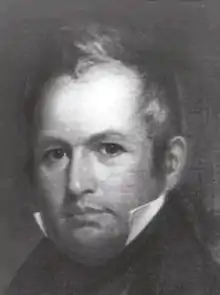Joseph Ritner
Joseph Ritner (March 25, 1780 – October 16, 1869[1][2]) was the eighth Governor of the commonwealth of Pennsylvania, elected as a member of the Anti-Masonic Party. He was elected Governor of Pennsylvania in the 1835 Pennsylvania gubernatorial election, and served from 1835 to 1839. Controversy surrounding his 1838 electoral defeat led to the Buckshot War. In 1856, Governor Ritner was a delegate to the first Republican National Convention in Philadelphia.
Joseph Ritner | |
|---|---|
 | |
| 8th Governor of Pennsylvania | |
| In office December 15, 1835 – January 15, 1839 | |
| Preceded by | George Wolf |
| Succeeded by | David R. Porter |
| Speaker of the Pennsylvania House of Representatives | |
| In office 1826–1828 | |
| Preceded by | Joel Barlow Sutherland |
| Succeeded by | Ner Middleswarth |
| Member of the Pennsylvania House of Representatives | |
| In office 1820–1826 | |
| Personal details | |
| Born | March 25, 1780 Reading, Pennsylvania |
| Died | October 16, 1869 (aged 89) Mount Rock, Cumberland County, Pennsylvania |
| Political party | Democratic-Republican (before 1828) Anti-Masonic (1828–1839) Whig (1839–1854) Republican (1854–1869) |
| Spouse(s) | Susan Alter (1801–1852; her death) |
| Profession | Farmer |
Early life
Ritner was born in Berks County, Pennsylvania on March 25, 1780. His parents were of German heritage, and Ritner was primarily self-educated, including learning to read and write in English while also acquiring a working knowledge of German. He moved to Cumberland County as a teenager, where he worked as a farm hand and laborer until he purchased a farm of his own in Washington County. In 1801, Ritner married Susan Alter,[3] and they were the parents of 10 children.[3] The Washington County farm had been owned by Ritner's wife's uncle, and included a large library, which enabled Ritner to continue his efforts at self-study.[3]
During the War of 1812, Ritner served first as commander of a Washington County militia company, the Rifle Rangers. He later served as a private with his regiment in western Pennsylvania and Ohio.
Political career
In 1820, Ritner was elected road supervisor in Washington County. Later that year he was elected to the Pennsylvania House of Representatives as a Democratic-Republican. He was reelected five times, and was Speaker in his final two terms.
Ritner became involved with the Anti-Masonic movement in the late 1820s, and after two defeats for governor, he won the 1835 election. When the Second Bank of the United States lost its federal charter in 1836, Ritner signed legislation giving it a state charter. As a supporter of public education, Ritner prevented repeal of Pennsylvania's Public School Law of 1834, and succeeded in passage of an enhanced public school measure in 1836.
An opponent of slavery, Ritner was the inspiration for an abolitionist poem by John Greenleaf Whittier, 1836's Ritner, in which Whittier praised the anti-slavery sentiment of the governor's annual message to the state legislature.
Ritner's reputation was negatively affected by Anti-Masonic efforts to gerrymander state legislative districts for their benefit. In addition, as Anti-Masons attempted to expand their support by taking positions on other issues, including expanded construction of public works, Ritner was criticized for allegedly using public rail and canal projects as a source of patronage.
In 1838, Ritner, running as an Anti-Mason with the support of the emerging Whig Party, narrowly lost his bid for reelection to Democratic nominee David Rittenhouse Porter. Ritner and his supporters unsuccessfully attempted to contest the election, including an effort by Ritner to mobilize the state militia. (The militia were to be armed with buckshot, thus giving the event its name.)
After leaving office, Ritner settled on a farm in Cumberland County. He suffered from cataracts, and surgery in 1839 restored the sight in his right eye, though he remained blind in his left.
With the end of the Anti-Masonic Party, Ritner actively supported the Whigs. In 1849 newly elected Whig President Zachary Taylor nominated Ritner for the post of Director of the United States Mint, then in Philadelphia. Taylor died before the nomination was acted on, so Ritner was never confirmed.
Ritner joined the Republican Party when it was founded in the mid-1850s, and was a delegate to the 1856 Republican National Convention.
Death and legacy
He died on October 16, 1869, and was buried at Mount Rock Cemetery in Mount Rock, Pennsylvania.[4][5]
Governor Ritner has a residence hall named in his honor on the University Park campus of Penn State. Ritner Street in Philadelphia is also named in his honor.
In 1938, the state of Pennsylvania dedicated the Governor Ritner Highway, which connects Carlisle and Shippensburg along Route 11 in Cumberland County.
See also
- Speaker of the Pennsylvania House of Representatives
References
- http://www.portal.state.pa.us/portal/server.pt/community/1790-1879/4283/joseph_ritner/444201
- "Joseph Ritner-Susan Alter, Marriage, Family, Genealogy, 26 May 1801, Pennsylvania". www-personal.umich.edu.
- "Governor Joseph Ritner – PHMC > Pennsylvania Governors". www.phmc.state.pa.us.
- "Governor Joseph Ritner". Pennsylvania Historical & Museum Commission.
- Sentinel, Joseph Cress The. "Mount Rock monument was dedicated to former governor Joseph Ritner".
External links
| Party political offices | ||
|---|---|---|
| First | Anti-Masonic nominee for Governor of Pennsylvania 1829, 1832, 1835, 1838 |
Succeeded by None |
| Political offices | ||
| Preceded by George Wolf |
Governor of Pennsylvania 1835–1839 |
Succeeded by David R. Porter |

